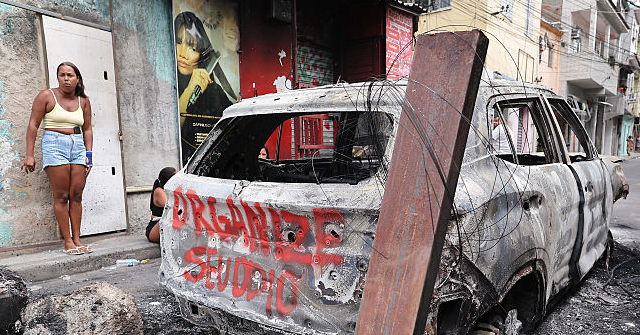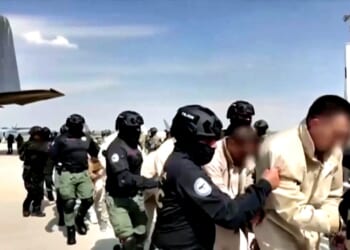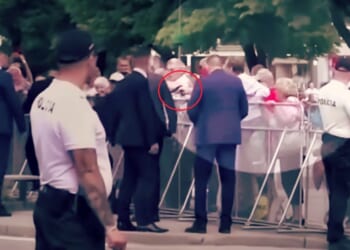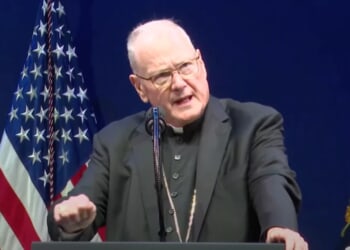Rio de Janeiro’s Civil Police on early Thursday morning updated the official death toll of Tuesday’s massive police raid against the deadly Comando Vermelho (“Red Command”) drug-trafficking gang from an initial 64 to 121.
On Tuesday, some 2,500 officials from Rio’s civil and military police conducted “Operation Containment,” a massive security operation in northern Rio’s Complexo do Alemão and Penha favelas against Red Command, one of the largest and most dangerous drug trafficking gangs in Brazil. The operation, now considered the most lethal in the country’s history, saw law enforcement officials execute hundreds of arrest warrants and search and seizure warrants against Red Command and its territorial expansion plans in the two northern favelas.
The operation was the end result of a year-long investigation against the criminal organization and authorized by Rio governor Cláudio Castro, a member of conservative former President Jair Bolsonaro’s Liberal Party (PL).
Red Command responded to the security operation by engaging in violent armed clashes with police officers, placing several burning barricades, and even using drones to launch bombs at officers. Four officials were killed during the operation. Governor Castro cataloged Red Command’s criminal actions as narco-terrorism.
On Wednesday, Colonel Marcelo de Menezes, Secretary of Rio’s Military Police, disclosed new details of the security operation to reporters. Reiterating that the operation stems from a year-long investigation, De Menezes said it took 60 days of planning and involved the use of the “BOPE wall,” a strategy from the Special Police Operations Battalion (BOPE) in which security agents surround criminals and push them towards the woods. The Secretary detailed that officials entered Rio’s Serra da Misericórdia (“Mercy Mountain”) forest hill and pushed the criminals to a location where a BOPE battalion was positioned beforehand.
De Menezes explained that the action was aimed at protecting the local population, as officials cornered criminals to ensure the physical safety of residents of the two favelas. Most of the confrontations, he further detailed, took place in the forest area between 6:00 a.m. and 9:00 p.m. (local time).
“We spread the troops across the terrain. The difference, compared to the images showing heavily armed criminals seeking refuge in the forest area, was the incursion of BOPE agents into the highest part of the mountain separating the two communities,” De Menezes said. “This action created what we call the ‘BOPE Wall,’ a line of containment formed by police officers who pushed the criminals to the top of the mountain.”
Rio’s Public Security Secretary, Victor Santos, agreed with the use of the strategy of taking the confrontation to the forest area of the favela, asserting that “the high lethality was predictable, but not desired,” and stressing that the only victims were the police officers that were killed during the operation.
The Brazilian outlet Metrópoles reported on Wednesday that police drones filmed Red Command members with rifles and combat gear before the security operation. An over six-minute video reviewed by the outlet reportedly revealed that Red Command members had “organized themselves in a coordinated manner before the arrival of security forces.”
Metrópoles also detailed that the 91 rifles seized from the criminal gang alone are valued at around 5.4 million Brazilian reais (roughly $929,000) at the black market. A total of 118 firearms were seized by police officers, including pistols, a revolver, and 14 explosive devices. All of the firearms, Metrópoles reported, “were ready for use and equipped with precision accessories, such as telescopic sights and holographic sights, capable of increasing the range and lethality of the shots.”
On Thursday morning, a BOPE helicopter flew over the battalion’s headquarters in Rio and scattered flower petals in honor of the police officers killed in the favelas during the operation.
Brazilian Justice Minister Ricardo Lewandowski said that the federal government will increase the number of Federal Highway Police officers on the roads by 50 and also the number of intelligence agents in the state. The Minister also granted vacancies in Brazilian federal prisons for the local government should they be requested.
Several Brazilian leftist lawmakers criticized “Operation Containment,” accusing the government of Rio de Janeiro of promoting a “massacre” and demanded changes in the state’s public security policy. Congresswoman Talíria Petrone, who leads the Socialism and Liberty party, reportedly asserted that the security operation demonstrated a “lack of planning.”
“What has been done to tackle criminal organizations is a bloodbath,” Petrone claimed. “For decades, we have been wiping up blood, and families continue to be destroyed by a public security model championed by Governor Cláudio Castro, who is incompetent and cowardly.”
Congressman Lindbergh Farias, of the ruling Workers’ Party (PT), criticized the operation and defended the approval of a Security Constitutional Amendment Proposal bill as an alternative to “ensure a security policy based on intelligence, citizenship, and effectiveness.”
“Governor Cláudio Castro insists on a failed model, which instead of prioritizing intelligence and integration, prefers military operations,” Farias said.
Hours after the operation, Justice Minister Lewandowski reportedly claimed that he did not receive a request from Governor Castro for federal assistance in the security operation. Lewandowski and Castro met on Wednesday and announced the creation of an emergency office to tackle organized crime in Rio de Janeiro.
Asked by reporters if Rio’s organized crime can be classified as narco-terrorism, the Justice Minister reportedly differed from Governor Castro and said that “it does not apply to the reality of the state.”
“Terrorism is one thing, criminal factions are another. Terrorism always involves an ideological issue. It is a political act, social repression with sporadic attacks,” Lewandowski said. “Criminal factions are made up of groups of people who systematically commit crimes that are listed in the Penal Code. Therefore, it is very easy to identify what a criminal faction is by the results of its actions.”
“These are two types of activities that should not be confused, and on the part of the federal government, we have no intention of mixing them,” he added, stressing that Brazilian legislation “clearly establishes the classifications for criminal organizations and terrorist groups.”
On Thursday, radical leftist President Luiz Inácio Lula da Silva signed a bill classifying new types of crimes and increasing protection for public officials in an effort to combat organized crime. In a Wednesday social media post, Lula said that a Security Constitutional Amendment Proposal (PEC) that his administration sent to Congress “will ensure that the different police forces work together to combat criminal factions.”
Congressman Mendonça Filho, the proposal’s rapporteur, told CNN Brasil on Thursday morning that the original text sent by the government to Congress “does not solve the problem” of organized crime in the country and called for “significant changes” to its contents.
“The PEC will be a consistent response to the factions [criminal gangs], but it will have significant changes in relation to the government’s text,” Filho said, and added that he will meet with the head of the Chamber of Deputies Hugo Motta to set the proposal’s schedule in parliament.
Christian K. Caruzo is a Venezuelan writer and documents life under socialism. You can follow him on Twitter here.
















